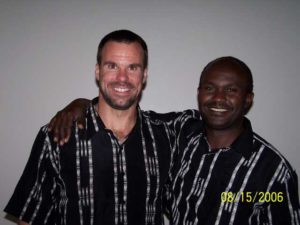As I write this, I’m in Amsterdam on my way to Nairobi, Kenya. There I will be meeting my longtime friend Kioko Mwangangi who is a pastor and regional leader in his denomination, Africa Inland Church. I will be doing a training for a group of pastors he has gathered together, and we will be preparing to launch a new Pathways network in this area about 1.5 hours south of Nairobi. From there I head to Zambia to do the same thing in Lusaka.

On Sunday afternoon, after I preach in his church, Kioko asked that I speak to a gathering of about 100-120 young people, ages 15-30. He suggested I talk about the dangers of Western influences, since many young people in Africa (and globally) are enamored with much from the West. So I thought I’d share some of my thoughts with you.
1. Several dangerous influences from America (and the West). A. Media and technology asphyxiation.

- There is a message communicated through this medium that is not good.
- Young people lose ability to create, to dream, to focus, attention span decreases, concentration is lost, and they become addicted to devices while insulating themselves in technology bubble. Relationships and interpersonal skills are lost. As I travel around the world, oftentimes I am not even able to make eye contact with people as they are so focused on their devices.

- Silicon Valley, creating hub for many devices, is engineering your phone, apps and social media to get you hooked = “brain hacking.” (Tristan Harris) They have an agenda! Snapchat, Spotify, Instagram, Twitter (Facebook is for “old” people!)
- http://www.cbsnews.com/news/brain-hacking-tech-insiders-60-minutes/
- Leads to fear, anxiety, loneliness – searching to be liked, to have likes or snapchat “streaks,” social media can easily consume you. They know how the brain works and write apps to get your brain to do certain things. These things affect how you think of yourself, others, your world, and the influence is enormous.
- Avg person checks their phone over 200X/day, young people much more, looking for updates, alerts, notifications. This gives your brain a cortisol adrenaline shot that keeps you wanting more, and anxious until the next time you check your phone.

B. Deeper philosophical underpinnings:
- Hedonism – love of pleasure and what feels good
- Materialism – an elevation of all the stuff around me rather than the values and priorities of the kingdom of God
- Consumerism – wanting more and better, never satisfied with what I am & have presently
- Self-absorption – my world revolves around me rather than God or others, I become insulated from others.
- Becomes idolatry.
C. Self
All of these are tied to me, my desires, my wants, my self-image, my reality, my world, and feed off of discontentment, feeling I deserve better, entitlement, using relationships with others so that I feel better about myself. All this is spreading at epidemic proportions from the West, but had its roots far before that. (1 John 2:15-17 – Read this!)

2. God’s message for where we should focus.
A. Book of 1 Corinthians was written to believers who lived in a culture much like our world with incredible temptations and challenges. Here were some of the issues Paul wrote about that they were dealing with:
- Divisions in the church (ch.1,3)
- God’s wisdom vs. wisdom from popular culture (ch.1-2)
- Sexual immorality and perversion (ch.5-6)
- Getting rich at the expense of others (ch.6)
- Marriage vs. singleness (ch.7)
- Idolatry (ch.8,10)
- My rights, fighting for my freedoms and what I deserve (ch.8-10)
B. All this leads to a powerful section in 1 Cor. 10:23-11:1.
- Limits and purpose of God’s gifts (23-30).
- Whether technology or money or meat sacrificed to idols, we have much freedom in Christ (26).
- However, what is your goal in your freedom? What is the endgame of your tech device, your video game, your relationship, anything in your life?
- God created good things to be enjoyed as long as they don’t consume us. (10:23 parallel to 6:12 – “I will not be dominated/ mastered/ controlled/ become enslaved by anything.”)
- Four guidelines Paul gives in 10:31-11:1
- Do all for God’s glory, not your own.
- Don’t do anything that will trip others up in their pursuit of God.
- Do what will bless and save others before pleasing myself. (10:24)
- Imitate godly leadership as we all imitate Christ.
3. Cultural values in Africa which America needs
- Priority on relationships. Long greetings, people are valued, family, personal connections, giving for each other. Relationship with Kioko is example.
- Spiritual appetite. Quick to pray, love to worship, church is central part of community (esp. in village), sensitivity to Spirit.
- Embracing the simple life. Kioko with farming (his passion). In village, life is difficult but simple and uncluttered, Americans accumulate junk (anchors). (Hebr.12:1 – lay aside every weight, sin that clings, and run with endurance the race, looking to Jesus…)
Other influences from the West which we probably won’t have time to discuss:
- Relativism, pluralism, syncretism (many roads, no absolutes, you can believe what you want, etc.). John 14:6, etc.
- Prosperity theology (most popular export) – Western influence is even felt in the church. John 16:32-33
